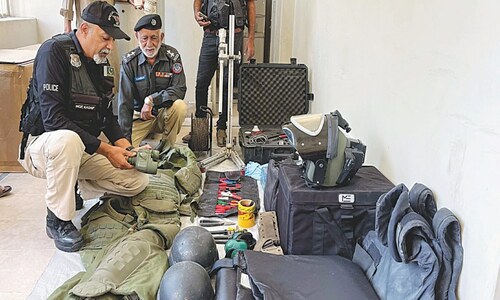KARACHI: While the trials of around 9,000 drug cases are being delayed at the two overburdened special courts for control of narcotic substances (CNS), commonly referred as anti-narcotics courts, in the city, authorities have so far unable to constitute two new courts despite a direction of the Supreme Court in order to clear a huge backlog of cases, it emerged on Sunday.
The federal authorities had constituted Special CNS Court-I and Special CNS Court-II in 2000 and 2003, respectively, in the provincial metropolis under the Control of Narcotic Substances Act, 1997 for dispensation of speedy justice.
Before the promulgation of the CNS Act, all cases of narcotics were tried by district and sessions judges. However, the cases were mostly decided after extraordinary delays because the sessions courts had to try a number of civil and criminal cases, too. Therefore, for quick disposal of narcotic cases, CNS courts were established by promulgating the CNS Act.
CNS courts are also functioning in Lahore, Islamabad, Peshawar and Quetta.
Judicial sources said that around 9,000 cases were presently pending trial before the two CNS courts in Karachi and because of such a huge backlog most cases were being decided after a long delay.
Despite SC’s order, two more courts not established yet
The federal ministry of law and justice has yet to sanction two new CNS courts despite the directive issued by the apex court around two and half years ago, they added.
The sources said after sanctioning the two new courts, the ministry will have to approach the Sindh High Court chief justice to nominate a sitting district and sessions judge for appointment as presiding officers for each court. They further said that one of the CNS court was vacant for a considerable period of time and recently the authorities had appointed a judge.
The two CNS courts are currently operating in the building of the Municipal Training and Research Institute (MTRI) in Clifton.
In March 2018, a two-judge SC bench had passed an order regarding the CNS courts of the city after an accused moved the Supreme Court for bail on the ground that he was behind bars since 2014 and not a single prosecution witness was examined in the case.
The Supreme Court had observed that the two CNS courts in Karachi were heavily overburdened since more than 5,000 cases were pending, at that time, and it was literally impossible that two courts could handle such a heavy backlog of cases.
“It is our opinion necessary that at least two more courts be created at Karachi for hearing and deciding CNS cases so that the backlog of cases is disposed of as early as possible. The creation of two more courts be taken up by the federal secretary law with all the relevant authorities and in this regard decision be made preferably within a period of two months and a report in this regard be submitted to the registrar of this court for our perusal in chamber,” the SC had ruled.
Published in Dawn, August 10th, 2020














































Dear visitor, the comments section is undergoing an overhaul and will return soon.